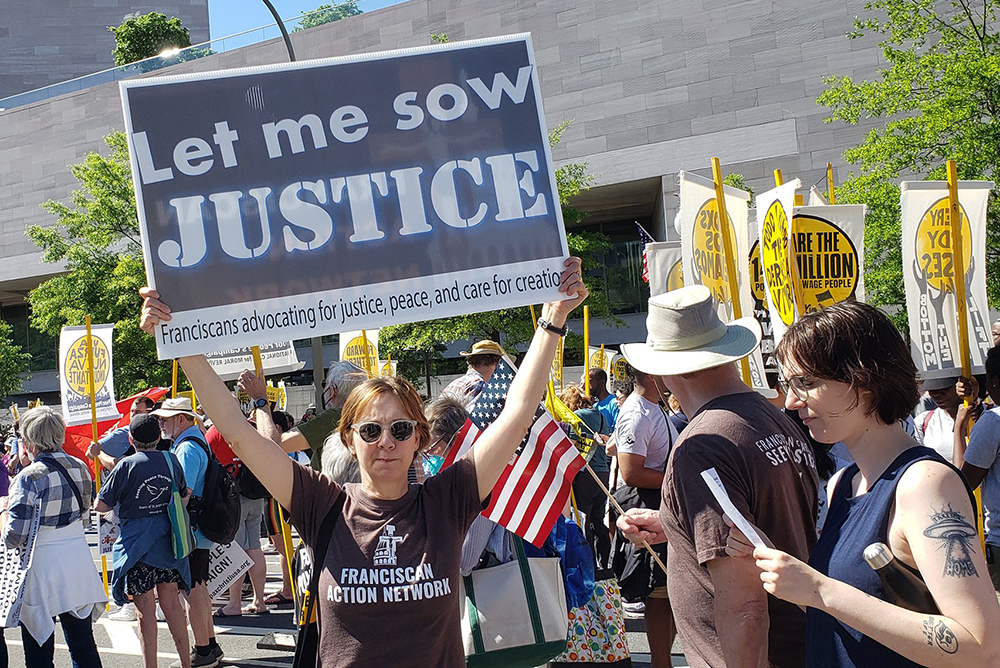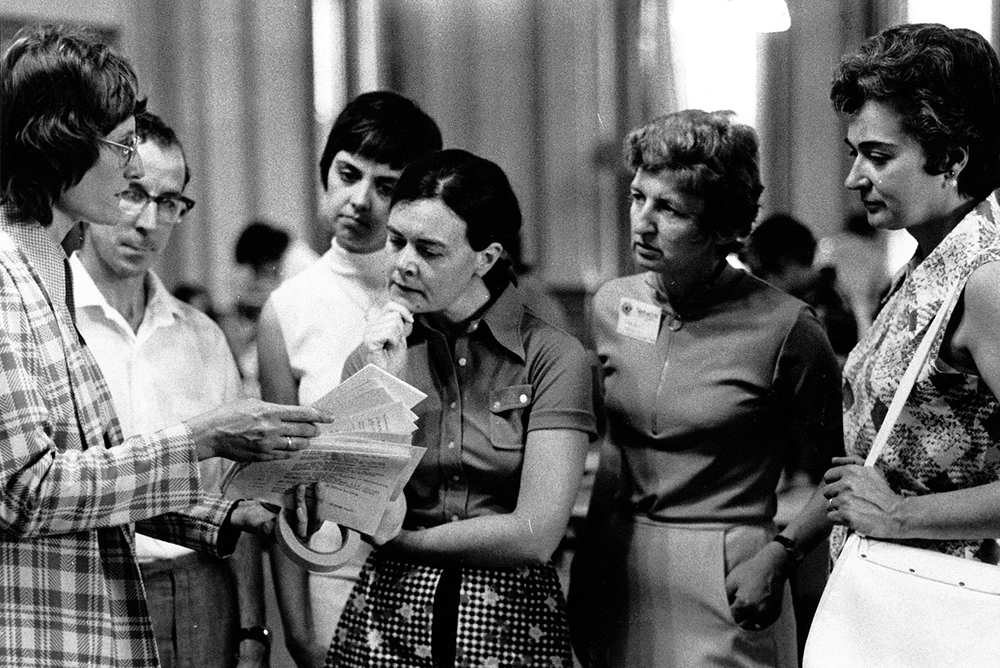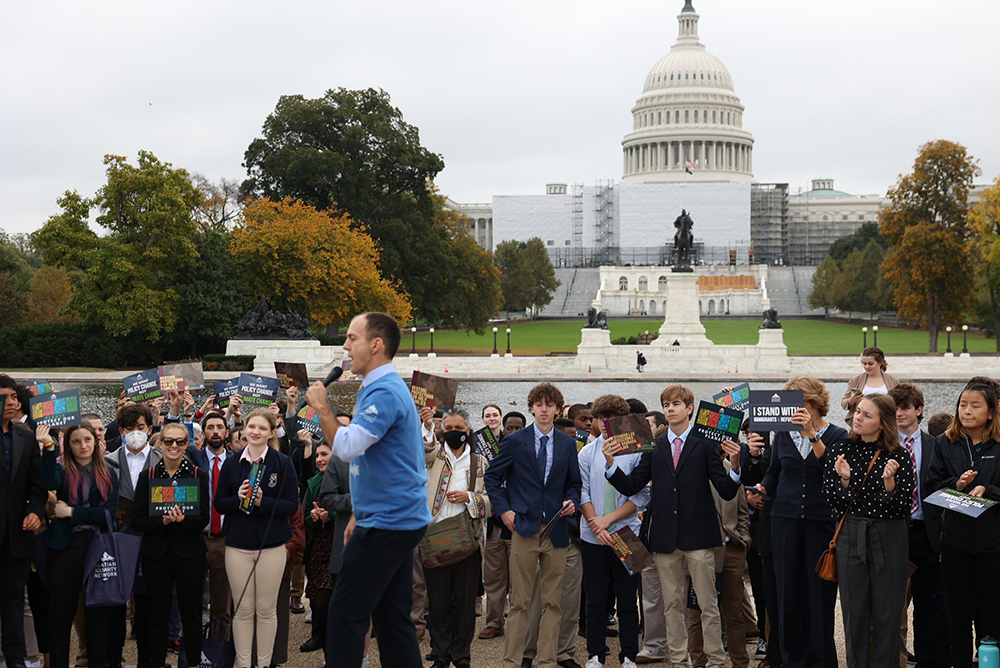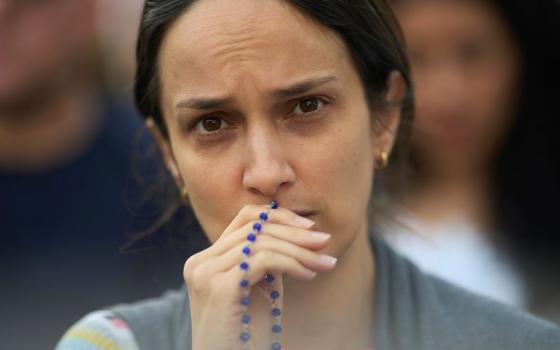
Members of Catholic groups take part in the Moral March on Washington June 18, 2022, sponsored by the Poor People's Campaign. The Catholic contingent was organized by Network, a Catholic social justice lobby; the Leadership Conference of Women; the Sisters of Mercy; Pax Christi USA; the Quixote Center; the Loretto Community; and the Franciscan Action Network. (CNS/Courtesy of Franciscan Action Network)
Listening to dear friends whose political views differ from mine, I realize how my education through Network and a commitment to Catholic social justice principles is often missing from such conversations. At times I have changed a conversation on U.S. politics by saying, "Our friendship means more to me than politics. Tell me about your family …"
At the risk of seeming to back away from entering dialogue, I'm recognizing the important role Network and intense discussions of Catholic social justice have played in the formation of my conscience — something many of my friends may not be aware of.
One example stands out for me. I remember attending one of our first provincial chapters in 1970 where we focused on integrating the teachings of the Second Vatican Council (1962-65) into religious life.
Advertisement
As 35 delegates of the School Sisters of Notre Dame met for the first time, we gathered in the library, which was set up with our provincial council seated at a table in the front of the room and the rest of us lined up at desks, much like a typical classroom. This familiar arrangement was challenged shortly after the opening prayer when one participant asked simply, "Could we rearrange our chairs in a circle with our provincial council sitting in the circle with us?" I can still remember the tense silence that followed her suggestion, and when she reminded us of the Vatican II principle of the "pyramid turning upside down to include all the people of God in dialogue," it sparked a new energy in the group.
Suddenly we were freeing ourselves of a hierarchical image of decision-making and testing the waters of a new way of making decisions. It was the beginning of seeing ourselves as having voices and sharing ideas that had been left only to leadership. As we sat in a circle seeing each other as sisters, exercising authority together, listening to the Spirit as one body, there was a seismic shift in our meeting and our living of religious life. (Fifty years later I am reminded of "synodal circles"!)
I mention this example to remind myself where Vatican II and Catholic social justice principles were leading us.
As we sat in a circle seeing each other as sisters, exercising authority together, listening to the Spirit as one body, there was a seismic shift in our meeting and our living of religious life.
As the council reminded us in Gaudium et Spes on Dec. 7, 1964, "The joys, hopes, the griefs and the anxieties of the men of this age, especially those who are poor or in any way afflicted, these are the joys and hopes, the griefs and anxieties of the followers of Christ. Indeed, nothing genuinely human fails to raise an echo in their hearts."
Many sisters were acquainted with these challenges from their ministry in hospitals, social work, schools, parish ministry and community building.
As the implementation of a Vatican II spirituality developed, many sisters were called to a deeper reflection on the Gospel and the life of Christ, seeing his love expressed in reaching out to the stranger, going beyond the comfortable confines of traditional Judaism, particularly with women, and risking the anger of his religious leaders.
As part of the School Sisters of Notre Dame ongoing education, we established a Center for Spiritual Development on the campus of St. Louis University, learning from our Jesuit brothers how to discern using the principles of St. Ignatius of Loyola and reading the Gospel with a new perspective. Yes, a personal relationship with Christ was important as emphasized in a pre-conciliar spirituality, as well standing with the marginalized in the struggle for justice.

For 21 years, women religious and others discussed legislative efforts during summer sessions organized by Network Catholic social justice lobby. (CNS/Courtesy of Network Catholic social justice lobby)
Two examples remind me of this transition. As part of our "action for justice," we chose to give a rent-free office to Clergy and Laity Concerned, a group working to bring the principles of Catholic social justice to everyday life. Learning from our "renters" what this meant was an education in itself, as we explored the Gospel in the context of the daily news and politics. "Reading the signs of the times," became a key for our relationship with Christ, honoring our personal relationship with him and exploring what these new insights might mean.
For me, it led to attending a symposium on the exercises in San Francisco in 1973, in which we focused on the poor Christ, making choices to let go of privilege and walk with those he met in everyday life — healing the daughter of a rude Syro-Phoenician woman, speaking to and ministering to a Samaritan woman, which was strictly forbidden in Judaism, casting the money changers out of the temple, and so much more.
These choices led to the cross, and as our symposium continued, we were invited to consider doing the same. We were invited to join the United Farm Workers strike in Modesto, California, and risk going to prison as a way of sharing the life of those who are without rights, struggling for justice. I, along with others, volunteered and spent two weeks in the Fresno County Industrial Farm, learning from our Chicano sisters and brothers what the real cost of discipleship could mean.

Jesuit students concerned about social justice gather in Washington for the 25th anniversary of the Ignatian Family Teach-In for Justice Oct. 22, 2022. (CNS/Courtesy of The Jesuit Post/Doris Sump)
At this time the Jesuits were holding their 32nd General Congregation (1974-75) during which they committed to the proposition that justice had to be an integral part of all their ministries in the service of faith. This was often expressed in the phrase: "Action for justice is constitutive of the Gospel message," and became foundational for decision-making.
Learning to stand with others sometimes meant a compassionate presence. One moment stands out when I was directing retreats in homes in rural Missouri. For five days, I would meet one-on-one with women eager to share their lives.
I remember one farmer's wife that I met after lunch when she knew her husband would be sleeping and had a few beers. They had three children, two boys and a girl, the latter about 10-years-old. She said that he was very abusive to her and the children. She revealed she was pregnant with their fourth child. Often at night she awakened to hear her 10-year-old crying because he was abusing her, and it was breaking her mother's heart. What should she do? I have never counseled abortion and briefly worked with Project Rachel, a Catholic program of spiritual direction offered to Catholic women who've had abortions. But as we anguished together about possible solutions, I could only share her anguish and invite her to trust that Christ would help her find a way.
As other examples of living a post-conciliar spirituality come to mind, I understand why the living of Catholic social principles led many sisters to demonstrate for justice and to stand with those seeking prison reform, an end to militarism, destruction of our common home, women's rights and so much more. At times, this stance leaves some women religious to focus on other issues than those chosen by our bishops; and this has led to "the cross."
As women religious diminish, may we continue to follow the crucified Christ, no matter the cost.







